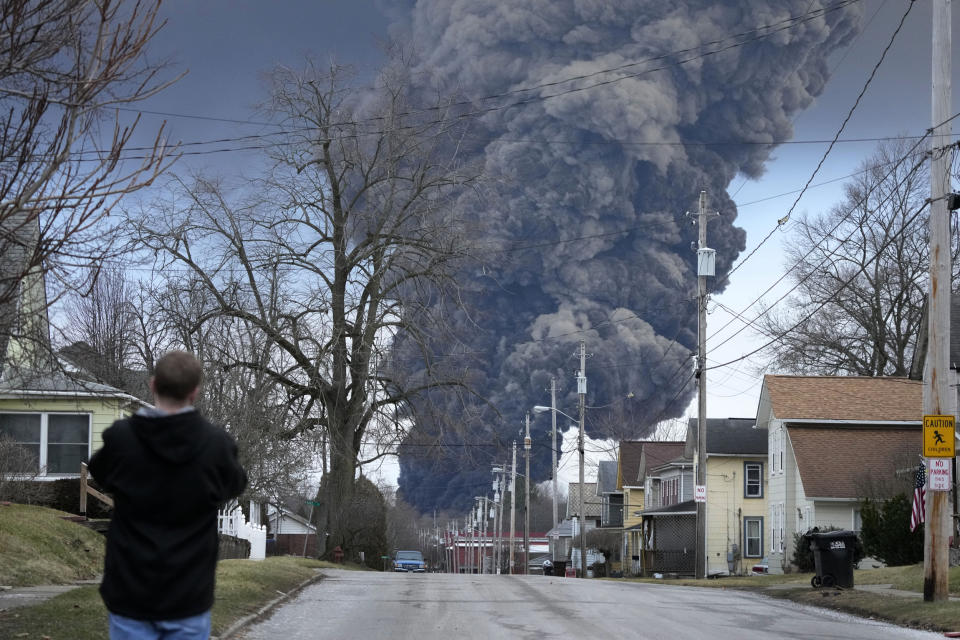'Like putting a puzzle together': CDC arrives in Ohio to investigate health risks from toxic train derailment
At a busy McDonald's drive-thru in East Palestine, Ohio, a team of epidemiologists, environmental health scientists and others stood outside Saturday handing out flyers. Each flyer has a survey with a QR code giving information on how to contact health officials.
Three weeks after a massive train derailment spewed toxic, cancer-causing fumes across the area, the Centers for Disease Control and Prevention has begun canvassing high-traffic areas of the Ohio town, encouraging residents to talk about their symptoms and long-term health fears.
"We really want to make sure that we target any resident who is potentially impacted," Jill Shugart, a senior environmental health specialist with the CDC's Agency for Toxic Substances and Disease Registry, said in an exclusive interview with NBC News. Shugart is leading the agency's response in East Palestine.
As cleanup from the disaster continues, people who live in and around the small town that borders Pennsylvania remain terrified that the chemicals that blanketed the area in a thick plume of smoke are harming their health. Some have been diagnosed with bronchitis or reporting otherwise unexplained nausea, rashes, irritated eyes and other symptoms.
"I've had a scratchy throat like everybody else," Mike Zelenak, an East Palestine business owner, told NBC News. "I get headaches." Zelenak owns property near the crash site, and he worries about risks for long-term illness.
Stories such as Zelenak's are exactly the kind of information the CDC is there to collect — but on a much larger scale.
The CDC staffers, along with representatives from the Environmental Protection Agency, FEMA, the federal Department of Health and Human Services and local government, are working to connect with and learn from anyone whose health may have been affected by the derailment's fallout.

Surveys include "questions like demographics, where the residents are living, what type of health effects they might be experiencing, and trying to come up with a timeline of when they might have been in the area when the incident happened," Shugart said. "It's sort of like putting a puzzle together."
Response so far, the CDC said, has been positive.
The outreach is expected to move into Pennsylvania in the coming days, and the agency will also focus on the health of first responders at the derailment scene. The questionnaires are expected to take about 30 minutes per person. Data collection could continue for up to two weeks.
That suggests the first answers from the CDC likely won't be available until more than a month after the derailment.
What are health risks from chemical exposure?
When the Norfolk Southern train derailed on Feb. 3, a highly flammable chemical called vinyl chloride caught fire and began spewing from the scene. It is used to make polyvinyl chloride, or PVC, pipes and packaging materials. It has also been used in the manufacture of vehicle upholstery, giving off that "new car smell."
The EPA says when inhaled in large quantities, vinyl chloride raises the risk for liver cancer.
The CDC can only deploy to areas of the country when states formally ask for help from the agency. Shugart said her team received the requests from both the Ohio and Pennsylvania departments of health two weeks after the derailment and mobilized within days.
CDC staffers said they haven't taken any unusual safety precautions in the area — yet. The team is staying in a hotel 30 miles away from East Palestine, in Cranberry Township, Pennsylvania. They say they are drinking the tap water at the hotel.

Meanwhile, "people are anxious and very worried," said Dr. Maureen Lichtveld, dean of the University of Pittsburgh School of Public Health. Lichtveld, who previously worked with the Agency for Toxic Substances and Disease Registry, said that it's critical for the public health teams at the disaster site to engage the community by listening to residents' concerns and being clear about their plans of action.
Community members should be "part of any action that we take, part of how to design that action, how to implement that action, and disseminate the information," Lichtveld said. "That is a tremendously important step to decrease the stress that's currently there."
Follow NBC HEALTH on Twitter & Facebook.
This article was originally published on NBCNews.com

